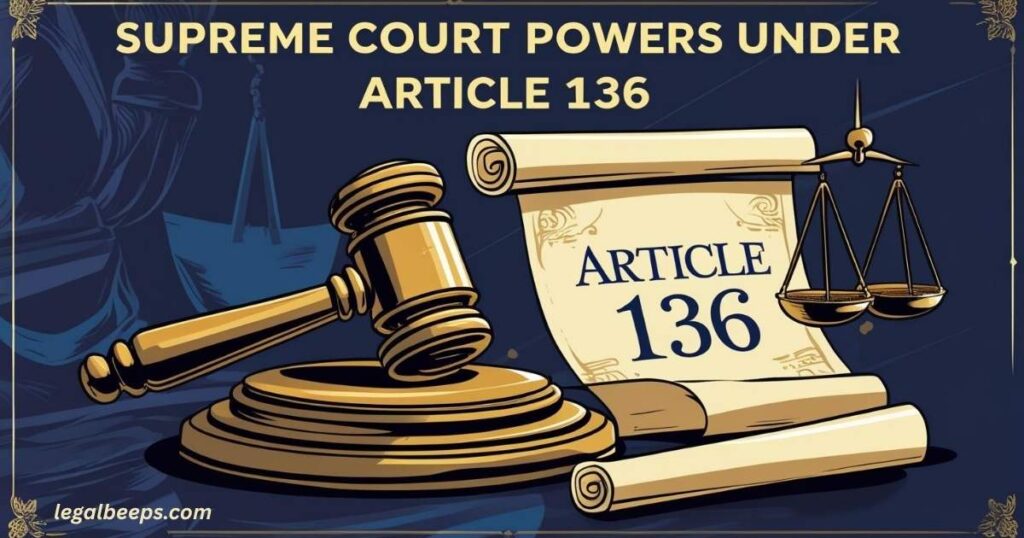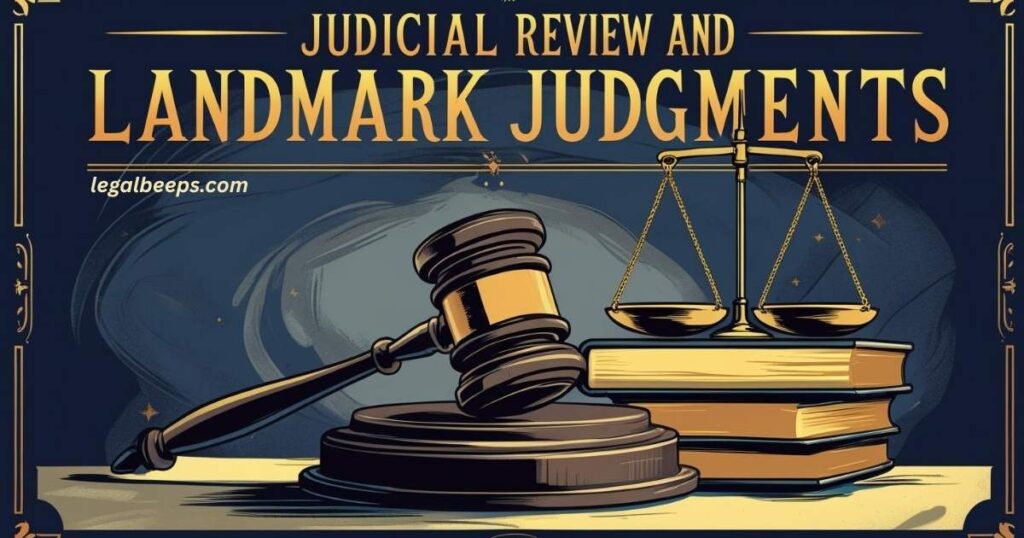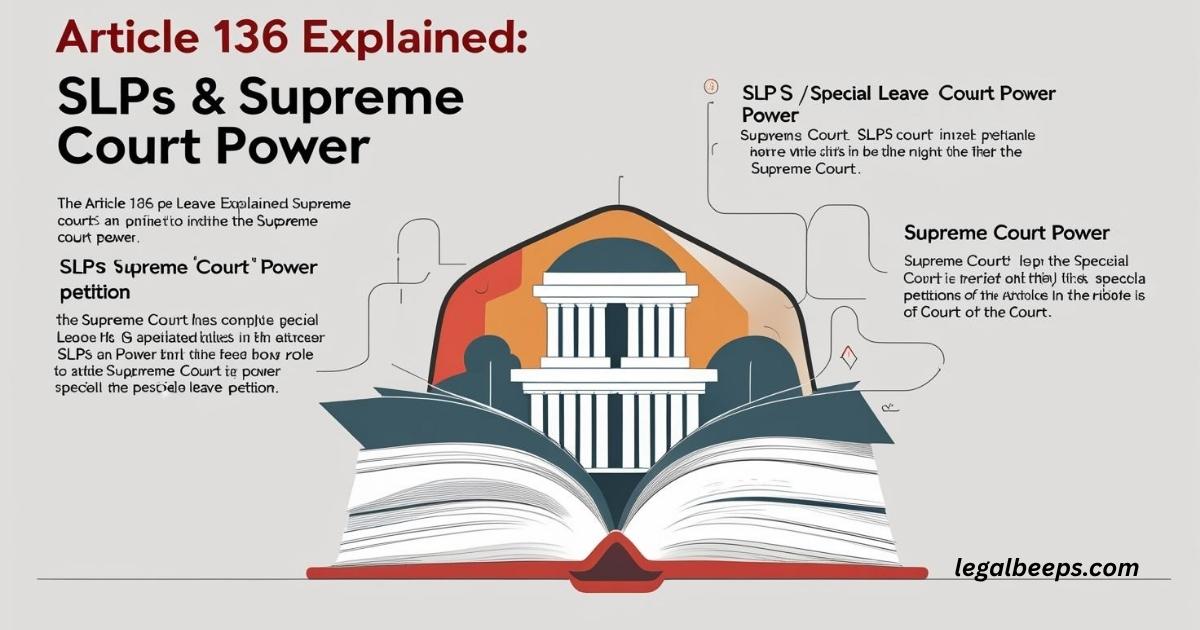Article 136 Explained is about a special power given to the Supreme Court of India. It allows the court to hear appeals in cases where normal appeal options are not available. This power is known as the SLP article, which means Special Leave Petition. People can request the court to step in if they feel justice has not been served. The 136 article is like a final hope for fairness.
In legal terms, this is called Art 136. Some also refer to it as Art 136 of Indian Constitution or 136 Article of Indian Constitution. The court can accept or reject the request, based on its importance. It is not a right but a special permission. Article 136 Explained helps people know how the Supreme Court can use this power. It plays an important role in fixing wrong decisions and ensuring justice for all.
What is Article 136 of the Indian Constitution?
What is Article 136 of the Indian Constitution? It is a legal provision that gives the Supreme Court special powers. This article allows the court to hear appeals from any judgment passed by lower courts or tribunals. It is used when no other legal remedy is available. Article 136 Explained acts as a final path to justice, especially in cases involving serious errors or injustice.
This article is often linked to the Special Leave Petition (SLP). It does not guarantee an appeal, but gives the Supreme Court discretion to accept or reject a case. What is Article 136 of the Indian Constitution? It is a safety net that protects individuals from unfair judgments. The court uses this power with great care, ensuring that it is only applied in rare and deserving cases where justice demands review.
Key Elements of Article 136 Explained
- Article 136 gives the Supreme Court special powers.
- It is used for both civil and criminal cases.
- The appeal is allowed only in special conditions.
- It helps correct injustice when other options fail.
Understanding Special Leave Petition (SLP)
Understanding Special Leave Petition (SLP) is important for anyone interested in how the Indian legal system works. An SLP is a request made to the Supreme Court when someone feels a lower court’s decision was unfair. It is not a right, but a special permission. This allows the court to decide if it should hear the case or not.
An SLP can be filed in both civil and criminal matters. It is used when no other appeal is available, or when serious injustice is believed to have occurred. The Supreme Court examines whether the case has merit before accepting it. Understanding Special Leave Petition (SLP) helps people see how justice can still be reached through this powerful legal tool, even after all normal legal steps have been used.
Definition
A Special Leave Petition (SLP) is a legal request made to the Supreme Court of India, asking for permission to appeal a decision made by a lower court. It is not an automatic right but a special privilege granted under Article 136 Explained of the Indian Constitution when the Court believes that a substantial question of law or injustice is involved.
Who Can File SLP in India?
Not everyone knows they can approach the Supreme Court through a Special Leave Petition (SLP). In India, SLP gives a person the chance to ask the highest court for justice, even after all lower courts have ruled. This option is available when a case involves a serious legal question or injustice that affects someone’s rights or the interpretation of law.
Anyone who feels wronged by a court decision can file an SLP. It’s not just for big companies or famous people. Even an individual citizen, whose appeal was rejected in a High Court, can approach the Supreme Court. However, filing an SLP doesn’t guarantee a hearing. The court checks if the case is important enough. If accepted, it becomes a way to review the decision legally and fairly.
Legal Procedure for Filing SLP in India
- Prepare the Petition
The first step is to draft the Special Leave Petition (SLP) with all case details, legal questions, and reasons for appeal. - Attach Required Documents
Include certified copies of judgments from the lower courts, affidavits, and any other supporting materials needed by the Supreme Court. - File Within 90 Days
The SLP must be filed within 90 days of the High Court’s judgment. Delays may require special permission from the court. - Supreme Court Review
The Supreme Court reviews the petition. If it finds merit, it grants “leave” to hear the case; otherwise, it may dismiss the SLP.
Supreme Court Powers Under Article 136

The Supreme Court of India holds special authority under Article 136 Explained of the Constitution. This article allows the court to grant Special Leave Petitions (SLPs), meaning it can review any judgment from a lower court. This power is not a right for citizens but a privilege given by the court.
Article 136 gives the Supreme Court wide discretionary power. It can step in when a serious injustice has been done, even if regular appeals are not possible. This helps the court correct major legal mistakes. Understanding the Supreme Court’s powers under Article 136 Explained helps people know when and how the court can protect justice beyond normal legal procedures.
Scope of This Article
- Explanation of Article 136: This article will provide a clear Article 136 Explained of the Indian Constitution, particularly focusing on its function and importance in the legal system.
- Filing SLP in India: It will cover who is eligible to file a Special Leave Petition (SLP) under Article 136 and the conditions necessary for filing such a petition.
- Procedure for SLP: The article will describe the step-by-step process for filing an SLP and what happens after the petition is filed.
- Significance and Limitations: The scope will also include the limitations of Article 136 and when the Supreme Court may or may not choose to hear a case under this provision.
Difference Between Appeal and SLP
An appeal is a legal process where a higher court reviews a lower court’s decision. It can be filed in both civil and criminal cases. The purpose is to seek a reversal or modification of the decision. In an appeal, the appellant argues that the lower court made an error that needs to be corrected..
SLP stands for Special Leave Petition, which is filed under Article 136 Explained of the Indian Constitution. It is used to seek permission from the Supreme Court to appeal against any court order. SLP is mainly used in exceptional cases where there’s a question of law or justice. Unlike an appeal, it doesn’t guarantee that the Supreme Court will hear the case.
| Aspect | Appeal | SLP |
| Legal Process | A review of the lower court’s decision. | A request to the Supreme Court for permission to appeal. |
| Purpose | To change or reverse a decision. | To seek leave for an appeal based on exceptional circumstances. |
| Filing Court | Lower or higher courts. | Directly to the Supreme Court. |
| Requirement | Common in both civil and criminal cases. | Filed in exceptional cases. |
When Can SLP Be Rejected?
- Lack of Legal Importance – SLP may be rejected if the case does not involve a significant legal question or is not of public interest. The Supreme Court only entertains cases that have broad legal implications.
- Frivolous or Vexatious Cases – If the petition is considered frivolous or filed to delay proceedings, the Supreme Court may reject it. It must show genuine grounds for appeal.
- Repetitive Applications – If an SLP is filed repeatedly on the same matter or judgment, without any new legal grounds, it can be rejected.
- Inadequate Evidence – If the petition lacks sufficient evidence or doesn’t meet legal requirements, the court may choose not to hear the case under Article 136 Explained.
Judicial Review and Landmark Judgments

Judicial review is the process where courts examine the actions of the executive or legislative branches to ensure they align with the constitution. Courts have the power to invalidate any law or action deemed unconstitutional. This principle helps in protecting citizens’ rights and maintaining the balance of power between different government branches.
Landmark judgments are legal decisions that have a significant impact on the law and society. These rulings often set precedents that influence future cases. They reflect the courts’ role in shaping law, ensuring justice, and addressing societal changes. Some landmark judgments have led to constitutional amendments or changes in law.
Landmark Judgments
- Defining Precedents: Landmark judgments set important legal precedents, guiding future cases and shaping the interpretation of laws.
- Constitutional Impact: These rulings often lead to changes in the constitution, influencing the legal framework of a country.
- Social Influence: Landmark judgments have the power to address social issues, influencing public policy and societal norms.
- Judicial Interpretation: They reflect the judiciary’s role in interpreting laws to adapt to evolving circumstances and protecting citizens’ rights.
Article 136 vs Article 226
Article 136 Explained of the Indian Constitution deals with the power of the Supreme Court to grant Special Leave to Appeal. This article allows individuals to approach the Supreme Court for permission to appeal against any judgment or order passed by any court or tribunal in India. The decision to grant or reject the leave is entirely at the discretion of the Supreme Court.
Article 226, on the other hand, grants High Courts the power to issue writs, directions, and orders for the enforcement of fundamental rights and other legal matters. This article is broader in scope compared to Article 136 Explained, as it enables the High Courts to deal with cases involving violation of rights, administrative decisions, or other legal issues.
| Aspect | Article 136 | Article 226 |
| Scope | Grants the Supreme Court special powers for appeal in any judgment or order. | Grants High Courts the power to issue writs for enforcement of rights. |
| Jurisdiction | Exclusive to the Supreme Court of India. | Exclusive to the High Courts of India. |
| Nature of Relief | Primarily for appeals and reviewing decisions. | Provides remedies through writs (e.g., habeas corpus, mandamus). |
| Limitation | No limitation on types of orders it can entertain. | Can be exercised for enforcement of fundamental rights or public duties. |
How Does Article 136 Work in Practice?
Article 136 Explained of the Indian Constitution grants the Supreme Court the power to grant special leave to appeal. This means that the court can allow an individual to challenge a judgment, order, or decree from any court or tribunal. It serves as a mechanism to ensure that no injustice goes uncorrected, especially when a substantial question of law or public interest is involved. The decision of granting special leave is entirely at the discretion of the Supreme Court.
In practice, a Special Leave Petition (SLP) is filed under Article 136 Explained, and the Supreme Court evaluates whether it should entertain the appeal. The court does not usually go into the merits of the case at this stage. Instead, it assesses whether the case involves legal principles or matters of significant public importance.
Read Also: Nirbhaya Case Details 2012 : What Happened In Nirbhaya Case?
Local Expertise: Filing SLP in Supreme Court from Anywhere in India
Filing an SLP in the Supreme Court can be a complex process, and local expertise is crucial for a successful outcome. Lawyers with experience in constitutional law can guide individuals through every step of the process. They help in drafting the petition, presenting the matter effectively, and meeting deadlines. Local lawyers familiar with the Supreme Court’s workings are vital to navigating the system efficiently.
In India, individuals from any part of the country can file an SLP, and local experts ensure that the petition complies with all required procedures. With their expertise, one can confidently file an SLP and have the best chance for the court’s approval to proceed with the case.
If You’re in Delhi / NCR:
- Legal Assistance Availability: If you’re in Delhi/NCR, there are numerous law firms and legal professionals specializing in various fields of law, providing accessible legal advice and services.
- Court Accessibility: Delhi houses the Supreme Court, High Court, and multiple district courts, offering easy access for filing cases, attending hearings, or seeking justice.
- Law Education and Resources: Delhi is home to top law schools and institutes, including Delhi University’s Faculty of Law, providing excellent educational resources for aspiring lawyers.
In Mumbai, Bangalore, Kolkata, Chennai:
- Economic Hubs: Mumbai, Bangalore, Kolkata, and Chennai are major economic centers in India, contributing significantly to the country’s GDP through industries like IT, finance, and manufacturing.
- Cultural Diversity: These cities are culturally rich, with a blend of traditional values and modern influences, offering vibrant arts, festivals, and cuisine from various communities.
- Infrastructure Development: Each city has seen rapid infrastructure growth, with improvements in transportation, real estate, and technology, making them prime urban destinations for businesses and residents.
- Educational and Healthcare Excellence: Mumbai, Bangalore, Kolkata, and Chennai are home to some of India’s top universities, medical institutions, and research centers, attracting students and professionals from across the country and abroad.
Pan-India Help:
- Nationwide Assistance: Pan-India help refers to services and support available across all regions of India, ensuring no one is left behind, regardless of their location.
- Wide Reach: This type of help is designed to cater to a diverse population, providing access to essential resources in urban and rural areas alike.
- Government and NGO Support: Various government schemes and non-governmental organizations offer pan-India help, including healthcare, education, and financial aid.
FAQ’s
What is Article 136 Explained?
Article 136 Explained gives the Supreme Court authority to hear appeals in special cases. It allows the court to step in after regular appeals are exhausted.
How does Article 136 Explained impact legal cases?
This article helps individuals seek justice when lower courts’ decisions seem unjust. It serves as a final chance for a legal review.
How does Article 136 Explained protect citizens?
It allows citizens to approach the Supreme Court when they believe a lower court’s decision was incorrect, ensuring fairness in the justice system.
Does Article 136 Explained guarantee a hearing?
No, Article 136 Explained doesn’t guarantee a hearing. The Supreme Court selectively chooses cases that it deems necessary for legal clarification or justice.
How does Article 136 Explained differ from regular appeals?
Unlike regular appeals, Article 136 offers the Supreme Court discretionary power to decide if the case warrants attention, even after lower courts’ verdicts.
Conclusion
Article 136 Explained provides valuable insight into the special powers of the Supreme Court of India. This article allows individuals to approach the court for a final review after all other appeal options have been exhausted. Often referred to as the SLP article, it offers the chance to request a review of decisions that may involve critical legal or constitutional issues. The 136 article of Indian Constitution is essential for ensuring justice in cases where lower court decisions are in question.
The court does not automatically accept every request under Art 136. It selectively considers cases that address significant legal matters. Whether it’s called Art 136 of Indian Constitution, 136 article, or SLP article, it serves as a critical tool in India’s legal system. Article 136 Explained helps people understand how this final opportunity for justice works, ensuring fairness in the legal process.
Meta Description“Learn how Article 136 Explained empowers the Supreme Court to review important cases and ensure justice in India’s legal system.”

